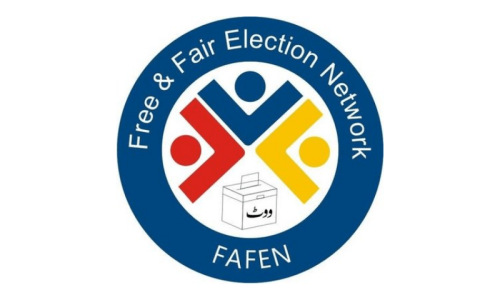KARACHI: The federal government must introduce legal and administrative safeguards to protect minorities against human rights violations, and take serious steps to stop forced faith conversions and ensure that blasphemy laws are not misused.
This was demanded at a joint press conference held by civil society and human rights activists at the Karachi Press Club on Thursday to mark National Minorities’ Day.
The press conference was addressed by Sindh Commission on Status of Women chairperson Nuzhat Shireen, MPA Naveed Anthony, Zahid Farooq of Urban Resource Centre, Naghma Iqtedar of The Knowledge Forum and Zafar Iqbal, a minorities rights activist.
“The founder of Pakistan, Quaid-i-Azam Mohammad Ali Jinnah, envisioned Pakistan as a peaceful country, where there is no discrimination, intolerance, and violence on any ground and all citizens are able to enjoy equality of rights, opportunity, and treatment, and are free to practice their faiths. However, the government needs to introduce reforms for laws and policies that affect minorities,” said Naghma Iqtedar while reading out a statement.
Civil society activists also demand revision of curricula for minorities
“A majority of the cases under charges of blasphemy are based on fabricated accusations which make the accused face several years of imprisonment. In contrast, the complainant making false allegations enjoys impunity despite committing forgery, and sometimes the accusations lead to mob violence against the accused, and the minority community, which must be stopped with legal and administrative measures on the part of the government,” the statement added.
“Citizens are guaranteed the right to religious freedom in Article 20 of the Constitution of Pakistan. It is illegal and unethical to compel them to change their faith by use of threat, coercion, and/or manipulation.”
“Our society has been intoxicated with hatred, discrimination, and extremism due to a lack of inaction by the government machinery, which resulted in an increase in incidents of intolerance and violence in the name of religion. The government must effectively take action against those who take the law into their own hands and engage in targeting religious minorities,” the statement further read.
It was said that the fulfillment of the rights of religious minorities is contingent upon an open acceptance of religious diversity and equal status as citizens. The real onus lies with the federal and provincial governments to address the gaps in governance, and address serious issues that minorities face in Pakistan.
The federal government has notified the curriculum for religious education solely for non-Muslim students for grades one to five and grades six to eight, which comprises content from seven religions, including Christianity, Hinduism, Sikhism, Baha’i, Kalash, Buddhism and Zoroastrianism, therefore, the Punjab and Sindh government must adopt a curriculum for the subject of religious education, and develop the textbooks and engage teachers to teach minority students the subject in schools.
The speakers called upon the federal and provincial governments to take measures in order to ensure equality of rights, religious freedom, and religious tolerance as per the constitution.
They said that affirmative action must be taken for the protection, promotion, and fulfillment of minority rights, particularly in the context of reforming the existing civil and criminal justice system to render it more sensitive to the needs of victims from minority communities. Moreover, use existing protections in the laws to prevent the miscarriage of justice, and bring the perpetrators and abettors involved to justice.
They added that a committee of experts comprising jurists and human rights activists should be constituted to revise the draft bill introducing safeguards against forced faith conversions in conformity with international human rights standards, including, in particular, with respect to religious freedom, as well as with the principle of legality.
They asked for a bill to amend the Child Marriage Restraint Act. It must be moved in the national and provincial legislative assemblies to ensure that the minimum marriageable age is set at 18 years for both boys and girls, and the marriage of minor children is declared null and void. As an interim measure, a hold should be placed on the validation of any marriages associated with faith conversions by the magistrates. It is necessary that verification or ascertaining of age, and freewill is required by senior civil judges in such cases.
They also sought a bill criminalising forced conversions to be tabled in the national and provincial legislative assemblies, and vetted by the standing committees of the parliament on human rights, and the ministry of law and justice, rather than the ministry or standing committee on religious affairs.
They called for ensuring that the allegations of forced conversion and forced marriage are independently, impartially, and promptly investigated keeping in view all conditions of coercion or threat under which marriages and religious conversions were made, and to apprehend the perpetrators and bring them to justice in proceedings that could guarantee the right to a fair trial, and ensure that victims had the right to access to justice and to an effective remedy.
They said that the authorities must “Introduce effective legal and administrative safeguards to prevent mob violence, and stop misuse of blasphemy laws for settling personal scores, political rivalries, or property disputes”.
“They should ensure that all those who incite or engage in violence against others based on allegations of blasphemy, as well as those who falsely accuse others of blasphemy, are brought to justice and duly punished.”
The demanded that legislative and educational measures be taken to ensure that girls and women were free from physical abuse, domestic and sexual violence, or being subjected to any medical procedure without informed consent, and deprivation of reproductive autonomy and rights. The curricula and textbooks must be reviewed to make education an instrument for promoting diversity and social cohesion to comply with Article 22(1) of the Constitution, they urged.
“A quota should be introduced and implemented for admission to educational institutions for students belonging to religious minorities,” they concluded.
Published in Dawn, August 12th, 2022













































Dear visitor, the comments section is undergoing an overhaul and will return soon.